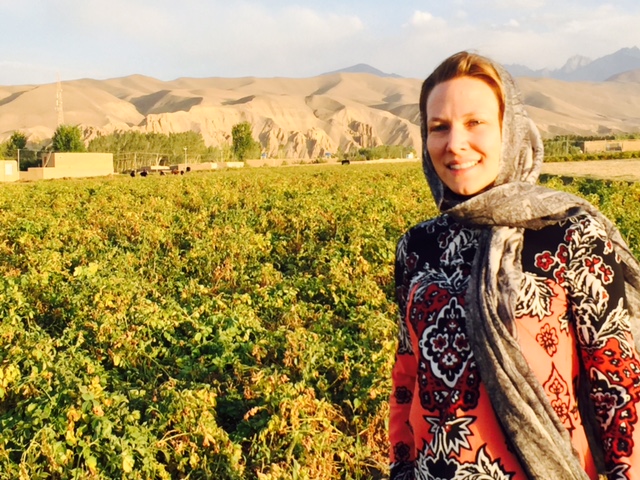
Jasmine Bates has spent most of her professional life in places like the Congo, Haiti and now Afghanistan, where for the past eight months she and a staff of 400 have been setting up classrooms and hiring teachers. The goal is to educate both girls and boys, and to provide guidance on agricultural issues that can help lift the average person in that war-torn country out of poverty, providing a pathway to employment and a better way of life.
Bates returned in April to the Roanoke Valley to visit family; she graduated from Cave Spring High School. “I’ve always seen my work as more of a calling and I knew since early in life that I wanted to commit myself to service.” With family in rural Appalachia, Bates said she knew about “relative poverty” and how many people struggle. She left Roanoke to attend American University in Washington DC and has never looked back.
Studying abroad in places like South Africa and Latin America, she saw high levels of poverty and people without access to adequate resources. “I felt like I could be an effective voice for these populations,” said the thirty-something Bates during her recent visit home. She now works for Catholic Relief Services, which has been in Afghanistan since 2001.
Bates said there is a “huge demand” from Afghans to educate their children, adding that local elders and families are very involved with Catholic Relief Services in providing that community-based education. For girls alone the enrollment numbers in recent years has gone from 17 percent to 70; overall the demand for childhood education has increased 8-fold.
Catholic Relief Services is not building brick and mortar schools; rather it is setting up classrooms in homes and businesses, and is focused on hiring teachers, “to get as many kids in the schools as possible. Afghans place a high premium on education and [want] a better future,” said Bates.
She says she was not overly concerned about going to Afghanistan, where there are other players besides the central government to deal with; Bates likes challenges and knew going there would represent one. About 30 percent of the country is controlled by what Bates calls “non- state actors” [like the Taliban].
That didn’t stop her from taking on the assignment, however. She is hopeful that the work her group is doing, centered on education, nutrition and agricultural livelihood, will become an effective determent that keeps people away from radical ideologies that they may view as a better way of life. It can also keep people from leaving the country – many Afghans have fled as refugees or immigrants over the past few decades.
Bates also fears that Afghanistan may “be forgotten” as other Middle East crises take center stage, noting that federal funding for Catholic Relief Services has dried up in recent years as other countries still pitch in financially.
“I knew that the security would be challenging [but] I wouldn’t do this work if I didn’t like challenges. It was a really great opportunity, particularly as a young woman going into a leadership role.” Bates does see herself as a role model for other women.
Saying she has the “utmost respect” for the U.S. Military that has worked to keep the peace in Afghanistan since 9/11, Bates adds that her experience in that country is certainly different. “My experience in working with local communities is just how warm the culture is – and how hopeful, resilient and inspiring the population is.”
Afghans want the same thing most people do, she adds – peace, security and a good future for their educated children. “There’s a common humanity throughout the world. Everyone wants safety and security … and a better way of life.”
Gene Marrano


